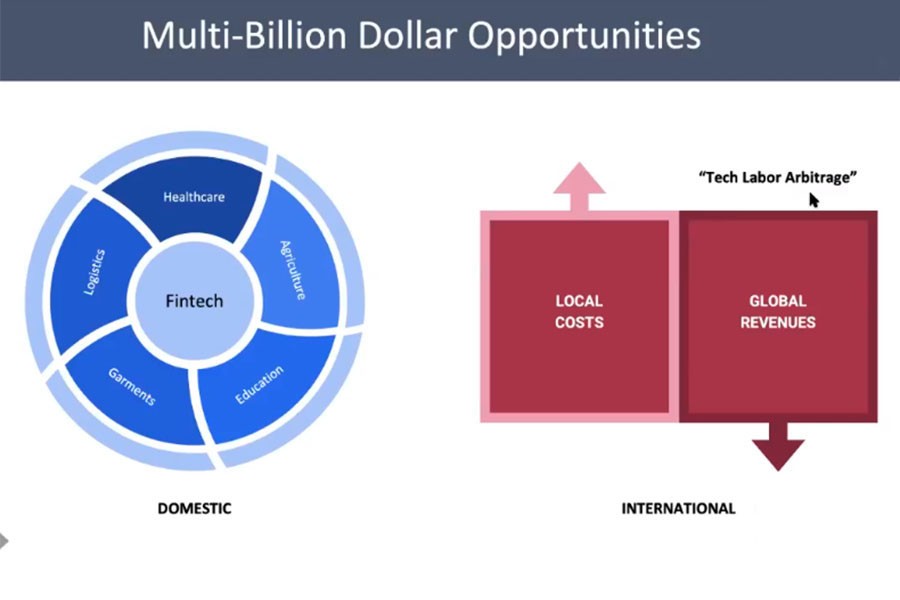
Published :
Updated :

Bangladesh's startup ecosystem is an untapped digital goldmine of Asia which needs a systematic country branding in an effort to attract more foreign investments and expand accordingly.
There is also need for government policy support, arrangement of corporate venture capital and enhanced industry-academia collaboration to propel the growth of startups which can make great contributions to the national economy.
The observations came at a webinar titled 'Unleashing the potential of the Bangladeshi Startup Ecosystem' organized by Innovision Consulting Private Limited in association with The Financial Express and Department of Economics, North South University (NSU) on Saturday evening.
Pathao and Anchorless Bangladesh were the thematic partners of the fourth episode of an integrated dialogue campaign styled as the 'Bangladesh Miracle-Celebrating 50 years of Development Progress of Bangladesh'.
Founding Partner & CEO of Anchorless Bangladesh and Senior Advisor to the NSU Startups Next Rahat Ahmed presented the keynote paper while Managing Director & Lead Consultant, Innovision Consulting Rubaiyath Sarwar moderated the virtual discussion.
Dean of the School of Business & Economics, North-South University Prof Dr. Abdul Hannan Chowdhury, President of Pathao Fahim Ahmed, SaaS Transformation leader at Collibra Inc. Shamma Raghib, Chief Executive Officer (CEO) of Light Castle Partners Bijon Islam, Chairman & CEO of Innovision Consulting Sadruddin Imran, Investment Associate of Luge Capital Laviva Mazhar spoke on the occasion.
Presenting the keynote paper, Rahat Ahmed said Bangladeshi startups drew $40 million in the last calendar year which was very scanty comparing to other regions.
"For its population size and density coupled with continuous economic growth, Bangladeshi startups have been funded with $0.92 per person that is an incredible contrast to India and Indonesia, both above $30," he said.
Highlighting the role of academic institutions for creating an enabling environment for the startups, Dr. Hannan Chowdhury said there are plenty of startups and successful businesses established in the country but the question looms with getting global class CEOs or founders.
"We are yet to go a long way," he said, adding: "Our academic system needs to incorporate many advanced topics which are very pertinent at this moment, in terms of technology, the analytics part and all sorts of digital marketing and some aspects of frontier technologies."
"We are behind in terms of leadership training, we are behind in terms of even pushing our students to go for entrepreneurship rather than focusing heavily on working under somebody else," he said.
He, however, said some tertiary educational institutions are looking to fill the gaps.
President of Pathao Fahim Ahmed said the startup operators face challenges related to scaling, competitiveness and capital.
"Many companies falter in the problem identification, some are not ambitious enough in identifying a problem and scale up with the solution," he added.
Sharing his experience with Pathao, a local startup providing a wide range of service, Mr Ahmed said it is imperative to approach with a startup mindset within the business operations.
Responding to a query, he said there is a need for greater collaboration among the government agencies especially related to regulations in a bid to establish an inclusive ecosystem though the government has initiated a number of platforms for funding and incubating the startups.
Laviva Mazhar said there are huge opportunities in Bangladesh's startup ecosystem considering the huge market against the size of the population.
Sharing her experience with investment management in Canadian startups, she said: "I think it is possible to build a huge business because of the population in Bangladesh even without need to expand in cross-border region."
Since startups are getting more attention across the globe, new funding opportunities are also being created, she said, adding that a national ecosystem has to have some qualifications to attract international venture capital.
Sadruddin Imran said there is a strong need for promoting the success of the Bangladeshi startup entities and the potentials of the country's startup ecosystem.
"As a country, Bangladesh is very poor in communicating. A lot of things are happening that are interesting but remain unknown to outside world," said Mr Imran.
Shamma Raghib said there are still huge untapped opportunities in Bangladesh but numerous problems need to be solved in areas like traffic and agricultural supply chain.
She stressed the need for identifying and tackling the local problems having global relevance especially in neighbouring countries to move ahead with the startup operations.
Bijon Islam suggested creating global brand perception and reforming the market entry process in Bangladesh to strengthen the startup ecosystem.
"We need systematically and consistently promote Brand Bangladesh by emulating successful competitors," he said.
He also suggested creating advocates from globally acclaimed Bangladeshis or influential non-resident Bangladeshis to reach out to prospective investors and create positive association.
Rubaiyath Sarwar said Bangladeshi startup ecosystem is very vibrant and youthful one but it needs a lot more support to reap the desired benefit.
"Comparing to the neighbouring startup ecosystems, Bangladesh is lacking amenities despite the potential," he said.
Bangladesh Miracle, an integrated dialogue campaign, is being organised by Innovision Limited in association with The Financial Express and Department of Economics, North South University.
Other partners of the event are mPower, NextGenEdu, Simprints Technology, GAIN, WaterAid, BIID, Pathao, Anchorless Bangladesh, Sarabangla, Colours 101.6 Fm. Windmill Advertising, Young Economists' Forum (YEF) of NSU and Printagraphy.
saif.febd@gmail.com


 For all latest news, follow The Financial Express Google News channel.
For all latest news, follow The Financial Express Google News channel.